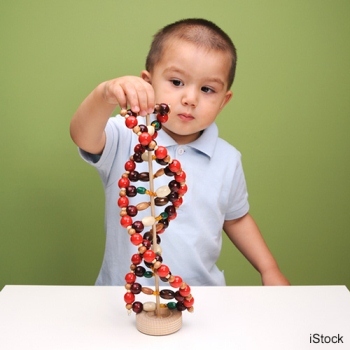
Newborn screening is one of the nation's most successful public health programs, each year sparing thousands of American infants from a lifetime of severe disability or premature death. Using a few drops of blood from an infant's heel, state newborn screening programs test for a few dozen debilitating disorders that may be present at birth and which can cause significant problems unless there is early diagnosis and intervention.
Now, more than 50 years after the advent of newborn screening, a newer, much more powerful tool for detecting hidden genetic risks for a much longer list of conditions may soon be available for routine use -- genome sequencing.
If used appropriately, genome sequencing holds great promise for improving health in childhood and beyond. It could give us new insights into health and disease, even helping unravel the relationships between biological and environmental influences. And it could empower people to take active steps to prevent health problems for which they are at particular risk.
But that prospect raises important questions -- how can we best use that vast amount of information to improve a child's health now and across his or her lifetime? And what should we do with the information when we encounter a condition for which there is no treatment? Who should have access to -- and control over -- this information about a person? With genome sequencing technologies advancing rapidly, we need to consider carefully these and other important medical and ethical questions.
The National Institutes of Health has funded four pilot projects to explore the use of genome sequencing in health care of newborns. Participation is voluntary. Researchers are working with families and health care providers to address such critical questions as:
- Can sequencing of newborns' genomes provide useful medical information beyond what current newborn screening already provides? How can genomic data contribute to medical recommendations and care?
Over the next several years, these pilot projects will yield useful information that will help us assess the potential for genome sequencing, its value in health care, and its ethical dimensions.
What might a future with routine genome sequencing look like? Let me tell you a plausible story of one person. Let's call her Anna.
*****
Anna is born prematurely in the year 2030. Shortly after her birth, her parents request genome-based screening for her.
In the hospital's neonatal intensive care unit, she develops necrotizing enterocolitis (NEC), a severe intestinal disease particularly prevalent in preemies. Clinical studies have shown a new class of medication is effective at treating NEC, but has serious side effects for some infants. Anna's genome-based newborn screening shows that she is not among the 8 percent of premature infants likely to suffer the side effects from this drug, so she receives it, and her NEC is cured.
Anna's genome sequencing results also show she has a genetic variant that research has shown to interact with extensive exposure to dog dander to cause asthma. So her grandparents are instructed to buy her a cat, not a dog, for her second birthday. Illness prevented, Anna never develops asthma.
Anna's genome sequence also shows elevated risk for Crohn's disease, so her primary care pediatrician closely monitors her for it. At age 11, although not yet symptomatic, Anna tests positive for an early biomarker of Crohn's. Researchers have developed a drug that blocks a protein overproduced in the bowel of some patients with Crohn's, and it prevents Anna from developing Crohn's.
Anna's genome-based screening also shows she has variants in seven genes that together increase her risk of early heart attack 5-fold. Decades later, at age 75, Anna develops left arm pain that she assumes is due to gardening, but her primary care provider knows her higher risk and diagnoses a heart attack. The drugs to treat her are selected based on her genome sequence.
Anna survives the heart attack and is alive and active well into the 22nd century and becomes a great-great-grandmother.
*****
Of course, we are a long way from realizing a story like Anna's. And yet, with continued scientific discoveries, such a reality is not hard to imagine. Genome sequencing has tremendous potential as a tool to improve human health, and it's important that we start thinking now about how to use it wisely. The new NIH-supported studies and other research represent first steps in this important journey.
- Baby's First Test is an online resource about current newborn screening programs, developed by the nonprofit organization Genetic Alliance in collaboration with -- and funded by -- the Health Resources and Services Administration. The March of Dimes and the Centers for Disease Control and Prevention also have helpful information about newborn screening.
